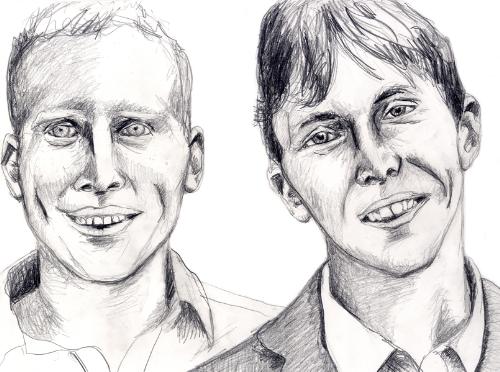
News
‘Deal with the Devil’: Harvard Medical School Faculty Grapple with Increased Industry Research Funding

News
As Dean Long’s Departure Looms, Harvard President Garber To Appoint Interim HGSE Dean

News
Harvard Students Rally in Solidarity with Pro-Palestine MIT Encampment Amid National Campus Turmoil

News
Attorneys Present Closing Arguments in Wrongful Death Trial Against CAMHS Employee

News
Harvard President Garber Declines To Rule Out Police Response To Campus Protests
Magnus and Tom: The Ticket for True Reform

It’s time for new leadership of the Undergraduate Council (UC). After the Wyclef fiasco, the failed Springfest Afterparty and the practically unattended Havana on the Habor cruise, it’s no surprise that the student body feels disconnected from its student government. Magnus Grimeland ’07 and Tom D. Hadfield ’08 have a clear vision to improve the life of Harvard students, a concrete set of proposals, and a history of getting things done. In fact, Magnus was trained in the Special Forces in Norway, while Tom sold his first Internet company for $40 million when he was in high school.
Ironically, there’s not much of a difference between the two other candidates—John S. Haddock ’07 and John F. Voith III ’07. They talk about “fixing the UC” and “listening to students,” but they haven’t managed to do either in the time they have been on the UC, and so it is hard to imagine that either of them will do so as president.
Students have a real choice in this election. We can opt for more of the same, or elect leaders of a student government of which we can all be proud. Unlike the other candidates, Magnus and Tom have five specific pledges to change fundamentally the UC’s role on campus.
First, they want to create an endowment to increase funding for student groups. Nearly all students agree that student groups are under-funded. They do some of the most admirable work on campus, but often on a shoe-string budget. The small grants from the UC Finance Committee don’t go far, meaning that there is little, if any, sizable funding available for student groups. Magnus and Tom’s goal is for the UC itself to raise one million dollars from alumni, which would be matched by the College. Such an endowment would generate approximately $150,000 per year to further support student groups on campus.
Their second pledge, to make coursepacks available online for free, goes beyond recognizing that coursepacks are too expensive and actually suggests a solution. It’s not unusual for coursepacks to cost over $100 largely because the Coop, Gnomon Copy, and XanEdu have a monopoly on the printing and distribution of coursepacks. Magnus and Tom pledge to make coursepacks available for download as PDF files so that students can print relevant articles on their own printers.
Third, they want to engage students in shaping the spending priorities of the College by developing a student-led $10-million investment plan. Harvard’s endowment grew by 19.2 percent last year, bringing the endowment’s overall value to $25.9 billion. Tom and Magnus want Harvard to invest in undergraduates. Their vision is for students and student groups to identify spending priorities—such as a student center or bike lanes in the Yard—and present a comprehensive investment plan to the College administration. As a community, we could change the campus forever.
Their fourth pledge is to increase party and House Committee (HoCo) funding. This is Magnus and Tom’s answer to the question of how to approach social planning. The UC’s party fund is a popular initiative, but demand far outstrips supply. Since the introduction of the super parties, many Houses no longer have a weekly UC party. The first-come-first-serve funding model for parties is ludicrous, and UC-funded parties are generally very poorly advertised. Magnus and Tom think the UC should decentralize social planning and support House life by providing more funding for smaller parties and encouraging cooperation between HoCos instead of wasting UC money on failed campus-wide events.
Finally, their fifth pledge is to redefine the relationship between the UC and the student body. Students no longer feel that the UC represents them. The UC web site is a mess and it’s not possible for students to access agendas, minutes, legislation, or roll-calls, let alone the time and location of the next UC meeting. Student interest is so low that there were not even enough candidates immediately on the ballot in many houses for September’s UC elections. Magnus and Tom will recruit students with web experience to redesign and maintain the UC website, make videos of UC meetings available for download on the web, and encourage more candidates to get on the ballot for UC elections. They will also institute a semiannual survey of all undergraduates to find out what students really want and publish a monthly UC newsletter to improve communication with the student body.
It’s unfortunate that several high-profile failures have overshadowed all the tremendous achievements of the UC. Harvard, the best university in the world, deserves a student government second to none. Mangus and Tom are the only candidates who can give us just that. They aren’t playing politics like the others. Instead, they really care about improving life for students at Harvard.
Marc P. Eskenazi ’07 is a government concentrator in Mather House. Wojtek P. Kaszynski ’07 is an applied mathematics concentrator in Quincy House. Ezra J. Rapoport ’06 is an engineering sciences concentrator in Mather House.
Grimeland & Hadfield Are Also Supported By
Hugo Van-Vuuren ’07
Nicholas C. Mahalec ’07
Steven C. Seidel ’07
Alexandra G. Russell ’06
Brian C. Aldrich ’07
Want to keep up with breaking news? Subscribe to our email newsletter.
